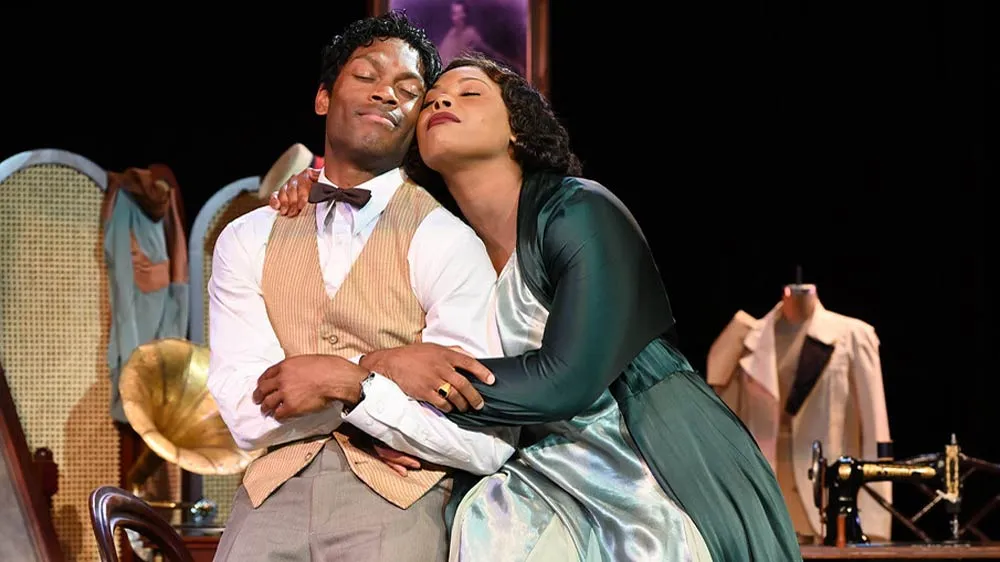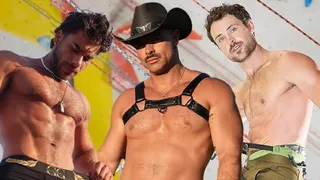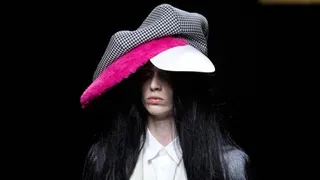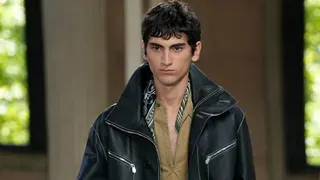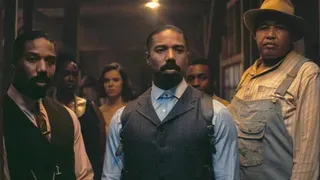March 2, 2018
Paris Fashion Week: Roaring 20s, Nature & Glam Rock
Thomas Adamson READ TIME: 4 MIN.
Paris Fashion Week is continuing in the French capital. Themes from the natural world, to the Roaring Twenties to the era of Glam Rock have been channeled on Day 2 of the shows.
Here are some of the fall-winter 2018 highlights:
LANVIN'S COMPROMISE
For his sophomore outing, designer Olivier Lapidus continued to lead Lanvin down its newer, more commercial path.
Lanvin is the oldest couture house in continuous existence and as such it holds an almost sacred place in the fashion firmament.
Reports last year that the relatively-unknown Lapidus (the house's third designer in as many years) planned to make Lanvin into "a French Michael Kors" were greeted by fashion insiders with snooty indignation.
Many criticized last year's debut show. Wednesday's was a compromise. It towed the line between some more salable color-blocking looks with the generous couture that has (until now) defined the house.
Bright hues - such as a yellow cadmium satin split dress and fitted ultramarine pants - provided an eye-catching reference to the '80s. In a nice touch, the pure color was so high-key it often looked fluorescent, but its impact was diminished by being used on otherwise conventional silhouettes. Belts with large square jewel encrustations were sometimes just distracting.
The best looks came when Lapidus stuck to the house DNA. A frothy, black pleated tulle couture gown hung down in a diamond from the bust. The material was so diaphanous it created myriad layers of transparency, and the pleats evoked almost the shell of an insect.
LACOSTE'S ARBOREAL MUSING
Nature was the creative starting point for Felipe Oliveira Baptista at Lacoste.
Guests slurped eco-coffee at the morning show in the northern reaches of Paris - and sat down underneath the shade of a giant (fake) tree that had been impressively erected inside the venue in the center of the catwalk.
It was a nod to a major forest creation project the house had done during World War II - as the collection itself delved into that the age-old maison's past in its associations with trees and with outdoors golf.
Large green leaf motifs were woven into loose gray sweaters and skirts with a rough knit surface, or in blue down a poncho alongside black Wellington boots. A loose silken cardigan with a sports feel shimmered in golden brown as if kissed by the autumnal sun.
Alongside the arboreal referencing were looks that evoked what Rene Lacoste would wear on the gold course.
It spawned a chic Argyle knit dress, but elsewhere plaid patterns that appeared on hats and down sporty jackets fared less well.
DRIES VAN NOTEN
"Graphic glam" meets "artful" were the words Belgian designer Dries Van Noten used to describe the concept of his complex fall-winter show that swirled with lines and prints.
But "encyclopedic fashion check list" might have been a better suggestion for the ambitious and stylish collection.
Geometric shapes that referenced the 1930s' Art Deco movement were used with flair on a broad, round-shouldered coat.
The metallic grooves in its pattern evoked an artist's etching.
Elsewhere, the Twenties were evoked, continuing the heady era's revival on the Paris Fashion Week runway. (The house of Poiret whose heyday was in that decade is being revived in Paris this season.)
Here, those styles were captured in silvery skirts with a pointed hem and on soft, loose silhouettes that did away with the body.
Bold glam rock looks completed the fall-winter collection.
One gargantuan ultramarine coat captured the bold exuberance of the early Seventies with a beautifully generous cut.
FASHION'S ECO-FIGHT
Ecology is on the agenda in only a handful of top Paris design houses.
One of them is Lacoste which launched a pro-animal initiative Wednesday in partnership with the Save Our Species program of the International Union for Conservation of Nature (IUCN).
A series of limited edition white polo shirts, the sportswear house's iconic garment, will feature logos of 10 of the world's most endangered species in the place of the usual crocodile.
The number produced in each series will correspond to the remaining population sizes in the wild as estimated by IUCN species experts.
That includes the Sumatran tiger (350 left), the Vaquita dolphin (30 left), the Javan rhinoceros (67 left) and the Burmese roofed turtle (40 left), according to the house.
A percentage of the sale revenues will go to the IUCN.
